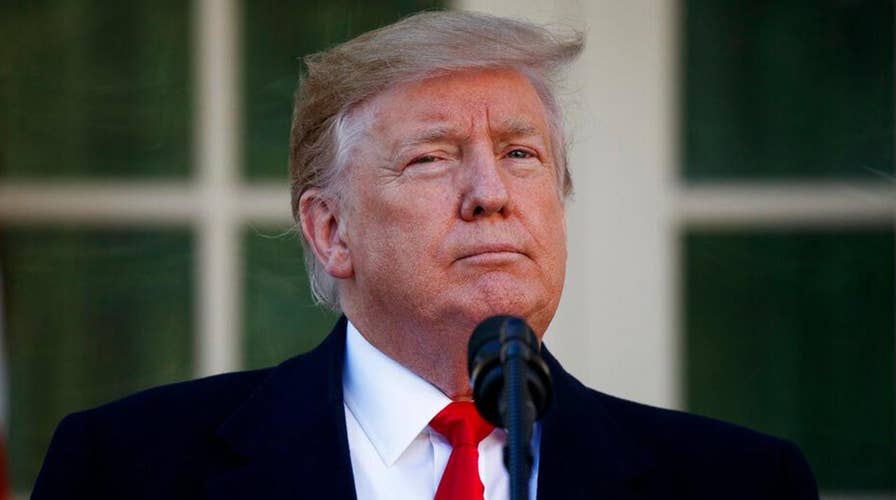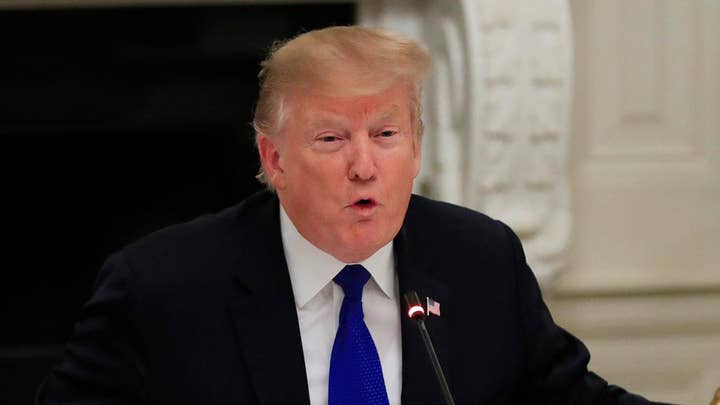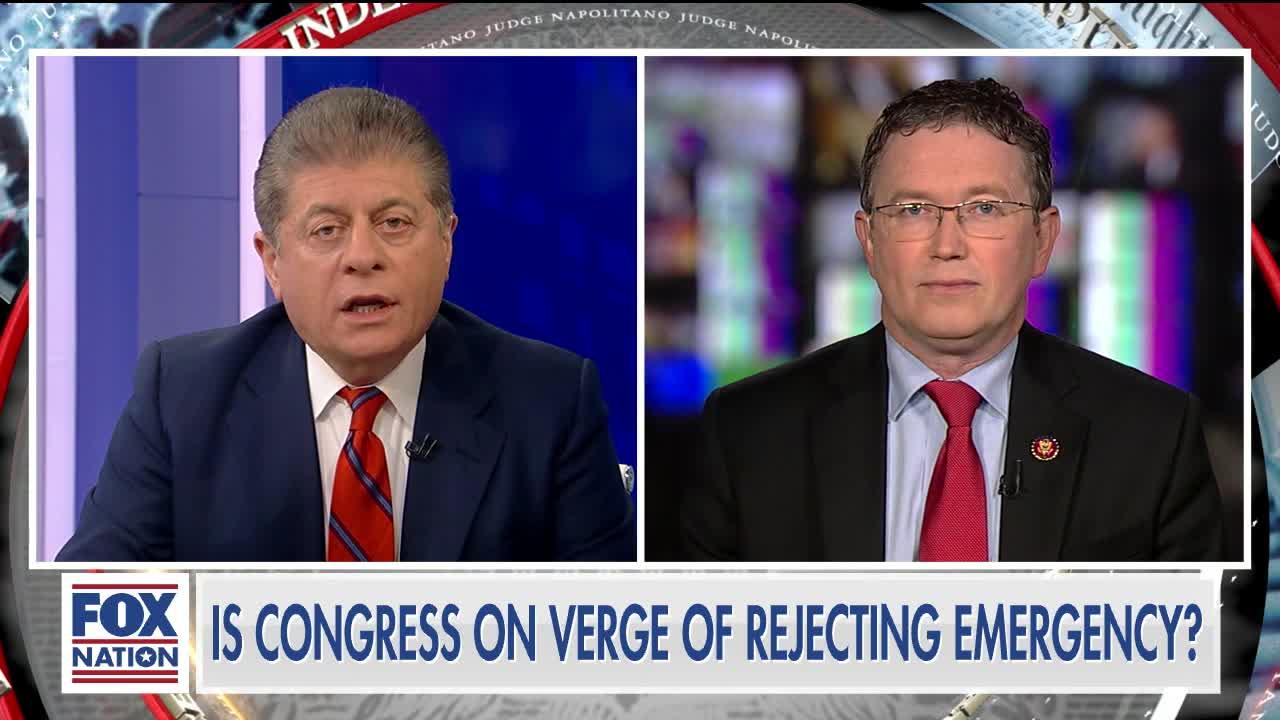Do you want ice cream or cake?
As someone who recently celebrated a birthday, I know it’s hard to decide.
The easy solution is an ice cream cake.
Head to Baskin-Robbins. Dairy Queen. Carvel. All we need is ice cream cake.
Congressional Republicans may need to enlist the services of Fudgie the Whale themselves. They too face a dessert dilemma. Ice cream or cake? Funds for a border wall? Or money for a military spending priority in their state or district?
This is where Fudgie comes in.
President Trump’s national emergency declaration plunders various appropriations silos, which Congress targeted for specific Pentagon and “Military Construction” projects. The national emergency redistributes money for the wall. GOPers want the wall. But they also don’t want President Trump to pilfer their pet project back home.
So, maybe the best solution to the quandary is the appropriations equivalent of an ice cream cake.
All lawmakers know right now are the general pots of money from which the Trump administration will loot funds for the wall. But everyone’s in the dark when it comes to specifics.
“I asked for the particulars,” said Senate Appropriations Committee Chairman Richard Shelby, R-Ala., after having breakfast at the Pentagon with Acting Defense Secretary Patrick Shanahan.
Democratic leaders of the House Appropriations and Armed Services Committees also wrote to Shanahan demanding what programs were on the chopping block.
“We request that you produce the requested documents and information no later than March 21, 2019,” wrote the Democrats.
This is what happens when the power of the purse is ceded to the executive. No one on Capitol Hill knows what’s going on.
The Senate is cruising toward following the House’s lead and voting to terminate the national emergency. The House already voted to undo the president’s action. The Senate will follow suit. At least four Senate Republicans will join all 47 Senate Democrats to cease the national emergency. Sen. Rand Paul, R-Ky., is among the four public GOP yeas. Paul says there are about ten other GOPers who will likely vote to halt the national emergency.
“If there is four, there’s ten,” said one Republican senator to Fox News.
But there aren’t enough votes in the House or Senate to override a prospective veto by Trump. Sixty-seven yeas are required in the Senate to override a presidential veto.
However, that’s why the list of “particulars,” as Shelby put it, is so important. If senators actually had the concrete information at their fingertips as to which military projects the administration may raid for the wall, it’s possible even more senators could vote to rebuff Trump.
If you’re for the wall, perhaps that’s a good argument to withhold the list until after the Senate’s taken the vote.
Sen. Mitt Romney, R-Utah, says he’d like to see the docket ahead of time.
“I would certainly support that. I know a number of people who probably would,” said Romney.
Senate Majority Leader Mitch McConnell, R-Ky., keeps saying that Republicans are having a “spirited discussion” about the vote to disapprove of the national emergency declaration and potential impacts on key military projects. McConnell backed Mr. Trump’s decision to declare the national emergency in an effort to avoid a second government shutdown. But McConnell adds “I advised the president not to take this route.” The Kentucky Republican also says he doesn’t “have a solution as to how this ends.” The only thing that’s clear is the Senate will vote to reject the national emergency declaration, tempting President Trump to issue his first veto.
A vote to overturn the resolution is yet another example of Senate GOP dissension when it comes to the president. In recent months, Republican senators broke with the president on a speedy withdrawal from Syria, how the administration dealt with Saudi Arabia following the death of Jamal Khashoggi and the cancellation of some Russian sanctions. Fox News is told Trump was close to facing a “jailbreak” of GOP defections had the government not re-opened when it did following the shutdown.
A vote to overturn the resolution is yet another example of Senate GOP dissension when it comes to the president.
If the Senate approves the package, the House and Senate are aligned and the package goes to President Trump, begging for the veto.
President Obama vetoed his first piece of legislation after only 11 months on the job. President George W. Bush never vetoed a bill until he was in office for five-and-a-half years. President Bill Clinton didn’t use a veto until two-and-a-half years into his presidency.
Presidents have only vetoed 2,500 pieces of legislation in the history of the republic. But the Founders wanted to give Congress one last chance to go over the head of the executive. That’s a veto override.
One of the few things more rare than a veto is a successful veto override.
LIZ CHENEY RIPS DEMS FOR LACK OF ACTION AGAINST OMAR OVER 'ANTI-SEMITIC' COMMENTS
The gambit requires a two-thirds vote by both bodies of Congress. That’s 67 votes in the Senate, provided all 100 senators cast ballots. And 427 House members cast ballots on the bill to block the national emergency last month. So the yardstick there is 285 yeas. There were 245 members who voted in favor of the bill. Thus, the House fell 40 votes short.
We are not expecting a successful override of a prospective veto of the national emergency. The math simply doesn’t work.
The last unsuccessful attempt to override a veto came in January 2016. President Barack Obama vetoed a Republican effort to repeal ObamaCare. The House voted 241-186, well short of the 285 yeas needed to override. The maneuver never went to the Senate since the override maneuver failed in the House.
Note that the vote to override is based on how many lawmakers take part in the override effort itself, not how many members voted on the bill when it passed both bodies. So, determining a precise number required to override is impossible until the veto override vote concludes.
The last successful veto override came in September 2016. Obama vetoed the Justice Against Sponsors of Terrorism Act. The measure allowed families of 9/11 victims to sue those responsible or the attacks, including Saudi Arabia. The Senate voted 97-1 to override Obama; 66 votes were needed. The House voted 348-77 with one lawmaker voting present. And 284 yeas were needed for the override.
The potential veto override attempt will only go to the House, since that’s the body which originated the disapproval legislation of the president’s national emergency declaration. If the House comes up short with the override initiative, the effort dies there. It never moves to the Senate.
CLICK HERE TO GET THE FOX NEWS APP
That’s an advantage for some Republican senators. They can be for the national emergency. Oppose Mr. Trump plundering money for the wall from projects important to them and know they’ll never have to cast a vote to override the expected veto. GOP senators can spin their votes and positions any way they want.
It’s the ice cream cake of politics. Having it both ways. Getting ice cream and cake, wrapped into one.








